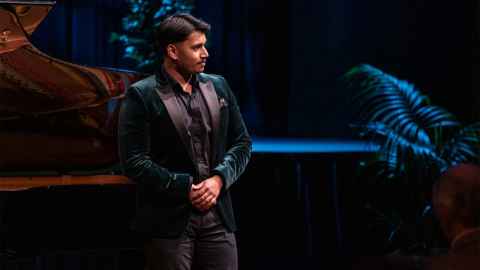Programme overview
In the BMus you’ll learn to both preserve the past and nurture progress as you focus on your chosen discipline and prepare to enter a dynamic music industry. You’ll learn from some of the finest instrument teachers in the country, as well as recognised music historians and composers. Our partnerships with industry organisations will put you in contact with leading local and international musicians.
Through your involvement in large and small ensembles, tutorials and studio classes, you’ll develop strong collaborative skills and grow your confidence.
You can study music alongside another discipline as part of a conjoint degree in Arts, Commerce, Engineering, Law or Science.

Conjoint programmes let you pursue two undergraduate bachelors degrees at the same time.
Programme structure
While each specialisation differs slightly, in the first year you will undertake a cross-genre music theory course, one in contemporary music culture, and a selection of other courses within your specialisation. You will also complete a General Education course.
In second year and beyond, you will continue to develop within your specialisation and you can explore areas of personal interest in complementary fields such as sonic arts, music education, production, and history.
More information regarding the programme structure can be found on the specialisation pages:
We recommend you choose WTRENG 100 Waipapa Taumata Rau: Engineering and Design for the Built Environment in Aotearoa New Zealand as your General Education course.
Most students need to take one General Education course.
Students should also be aware of the University’s Academic English Language Requirement.
2026 entry requirements
My highest qualification is from:
Secondary school qualifications
If you're joining us from secondary school, here's what you need to enter the programme.
You are guaranteed entry to this programme if you meet these requirements.
- First, you must meet the University Entrance (UE) standard.
- You must also meet the rank score for this programme. Not sure about your rank score? Use our rank score calculator.
- You may need to have studied certain subjects or achieved credits in particular subjects.
- Some programmes have additional requirements, such as an interview, portfolio or references.
Guaranteed rank score, subject and other requirements
If your rank score is slightly lower than the guaranteed score, we encourage you to still apply. We will consider your application if places are available. If you don’t meet the requirements, you may be able to apply under our Undergraduate Targeted Admission Schemes.
-
QualificationNCEA National Certificate of Educational AchievementScore required150
-
QualificationCIE Cambridge International ExaminationsScore required150
-
QualificationIB International BaccalaureateScore required26
Read more about entry requirements for New Zealand secondary school applicants.
Further requirements
Selection into the BMus programme will be based on your academic history and, for some music specialisations, on the strength of your audition or portfolio. (A specialisation in Musicology or Songcraft and Music Production has no audition or portfolio requirements).
View the audition or portfolio requirements for the following specialisations:
Tertiary qualifications
If you've studied at a tertiary institution, here's what you need to enter the programme.
You can transfer from another tertiary institution, or another University of Auckland qualification, if you meet these requirements.
Minimum grade requirements
These are the likely grades required, but they do not guarantee entry. Applicants may require higher grades to gain entry to this programme.
-
Grade requiredGPA Grade Point Average 2.2
-
Grade requiredGPE Grade Point Equivalent 2.2
Further requirements
Selection into the BMus programme will be based on your academic history and, for some music specialisations, on the strength of your audition or portfolio. (A specialisation in Musicology or Songcraft and and Music Production).
View the audition or portfolio requirements for the following specialisations:
Transfer of Credit - You can apply for transfer of credit for tertiary courses completed elsewhere as part of your Application for Admission. For more information, see External transfer of credit.
Other pathways to study
You could be eligible for another programme, or check out these alternative pathways:
- See if you meet the criteria for the Undergraduate Targeted Admission Scheme (UTAS).
- Bridge your educational gap with a preparation and foundation programme.
- If you are 20 on or before the first day of semester, have no formal University Entrance (UE) qualification, and are a New Zealand or Australian citizen or permanent resident you can apply for special admission.
- If you are under 20, have no formal University Entrance (UE) qualification, and are a New Zealand or Australian citizen or permanent resident you can apply for discretionary entrance.
- If you can demonstrate outstanding academic achievement and maturity, we offer admission to applicants under 16.
My highest qualification is from this country or region:
Secondary school qualifications
If you're joining us from secondary school, here's what you need to enter the programme.
You need to have one of the following:
- International Baccalaureate Diploma with a minimum total score of 24.
- General Certificate of Education (GCE) Advanced Level. You must have completed a minimum of three A-Level subjects.
- Cambridge International Examinations (CIE). You must have completed a minimum of three A-level subjects.
GCE ‘A’ Level requirements apply to ‘A’ Level qualifications examined by bodies such as AQA, OCR, Edexcel, WJEC, CCEA and Pearson Education Limited taken outside of New Zealand.
Minimum grade, subject and other requirements
Minimum requirements listed here are the likely grades required and do not guarantee entry. We assess each application individually and applicants may require a higher grade to be offered a place. Your CIE/GCE A level score is calculated on the best three academic subjects and General Studies cannot be included.
-
QualificationIB International Baccalaureate DiplomaScore required26QualificationIELTS Academic International English Language Testing SystemScore required6.0
No bands less than 5.5.
-
QualificationGCE A Level/CIE General Certificate of Education Advanced LevelScore requiredCCCQualificationIELTS Academic International English Language Testing SystemScore required6.0
No bands less than 5.5.
Further requirements
Selection into the BMus programme will be based on your academic history and, for some music specialisations, on the strength of your audition or portfolio. (A specialisation in Musicology or Songcraft and Music Production has no audition or portfolio requirements).
View the audition or portfolio requirements for the following specialisations:
Tertiary qualifications
If you've studied at a tertiary institution, here's what you need to enter the programme.
You can transfer from another tertiary institution if you meet these requirements.
You need to have the following:
One year successful bachelor-degree level study at a recognised university (or similar institution) overseas.
Minimum grade requirements
These are the likely grades required, but they do not guarantee entry. Applicants may require higher grades to gain entry to this programme.
-
Grade requiredGPE Grade Point Equivalent 2.2
-
QualificationIELTS Academic International English Language Testing SystemScore required6.0
No bands less than 5.5.
Further requirements
Selection into the BMus programme will be based on your academic history and, for some music specialisations, on the strength of your audition or portfolio. (A specialisation in Musicology or Songcraft and Music Production has no audition or portfolio requirements).
View the audition or portfolio requirements for the following specialisations:
Other pathways to study
You could be eligible for another programme, or check out these alternative pathways:
- Bridge your educational gap with a preparation and foundation programme.
- If you have an offer of place from us that is conditional on meeting English language requirements, you may be considered for English Pathway courses from the University of Auckland English Language Academy (ELA)
- If you are 20 on or before the first day of semester, have no formal University Entrance (UE) qualification, and are a New Zealand or Australian citizen or permanent resident you can apply for special admission.
- Completion of a 2.5 year Diploma in Music at SEGi College with a University of Auckland GPE of 2.2 (a cumulative GPA of 2.3 or above at SEGi College) will allow applicants to enter into Part II of the Bachelor of Music degree programme at the University of Auckland.
How much does a Bachelor of Music cost per year?
2026 fees
- Domestic students
- NZ$8,785.20*
- International students
- NZ$47,221*
Fees are set in advance of each calendar year and will be updated on this website. Fees are inclusive of 15% GST, but do not include the Student Services Fee, course books, travel and health insurance, or living costs. Amounts shown are indicative only. In addition to the tuition fees, there is a Student Services Fee of $9.44 per point, estimated at $1,132.80 for full-time study (120 points). Fees will be confirmed upon completion of enrolment into courses.
*Please note: amounts shown are indicative and estimates only.
Find out about financial support information
Scholarships and awards
Find out about the scholarships you may be eligible for.
Student loans and allowances
Are you a New Zealand citizen or resident? You could be eligible for a student loan or allowance.
Cost of living
Get an idea of how much accommodation and general living in Auckland will cost.
Key dates
Please note: We will consider late applications if places are still available. International students should start the application process as early as possible to allow sufficient time to apply for a visa.
Application closing dates
- Semester One 2026
- 8 December 2025
- Semester Two 2026
- 8 June 2026
Start dates
Here are the start dates for the programme.
| Semester One | Starts – 2 March |
|---|---|
| Ends – 29 June | |
| Semester Two | Starts – 20 July |
| Ends – 16 November |
| Semester One | Starts – 1 March |
|---|---|
| Ends – 28 June | |
| Semester Two | Starts – 19 July |
| Ends – 15 November |
Other important dates
See important dates for the academic year, including orientation, enrolment, study breaks, exams, and graduation.
How to apply
Applying for an undergraduate programme? Check out our step-by-step guide.
You will be required to audition if you are applying for the following specialisations:
- Creative Practice: Classical
- Creative Practice: Jazz
Creative Practice: Classical
- First you must complete your Application for Admission.
- Once you have completed your Application for Admission, our team will then get in touch with you to book you in for an in-person audition slot.
Dates for in-person auditions:
Audition 1
Application Deadline: 31 August 2025
Audition: 13 September 2025, 10:00 AM – 5:00 PM
Provisional Audition Date (if 13 September is full): 14 September, 10:00 AM – 3:00 PM
Audition 2
Application Deadline: 1 November 2025
Audition: 15 November, 10:00 AM – 5:00 PM
Location: University of Auckland City Campus, 6 Symonds Street, Auckland CBD 1010
If you are unable to attend an in-person audition, you can do an online audition.
Learn more about Creative Practice: Classical auditions.
Creative Practice: Jazz
- First you must complete your Application for Admission.
- Once you have completed your Application for Admission, our team will then get in touch with you to book you in for an in-person audition slot.
Dates for in-person auditions:
Audition 1
Application Deadline: 31 August 2025
Audition: 13 September 2025, 10:00 AM – 5:00 PM
Provisional Audition Date (if 13 September is full): 14 September 2025, 10:00 AM – 3:00 PM
Audition 2
Application Deadline: 1 November 2025
Audition: 15 November, 10:00 AM – 5:00 PM
Location: University of Auckland City Campus, Kenneth Myer Centre, 74 Shortland Street, Auckland CBD 1010
Live in-person auditions are always preferred as they give you the best possible opportunity to showcase your musical skills and a chance to meet the jazz staff. If you live outside the Auckland region, we welcome you to submit an online audition.
Learn more about Creative Practice: Jazz auditions.
If you have any queries, please contact the Student Hubs.
Where could this programme take you?
As a graduate you’ll have the skills and expertise to pursue a wide range of career opportunities in New Zealand and overseas. Building a career on stage is a frequent goal, but the music industry runs on more than performers and composers. There is a collection of people who keep the industry moving, such as writers, managers, producers and teachers.
Jobs related to this programme
- Arranger/composer/songwriter
- Arts administrator/manager/director
- Conductor
- Music director
- Music journalist
- Performer
- Radio/television/digital media/recording producer
- Music producer/sound engineer

Having moved to San Francisco to pursue his operatic career, rising star Shiddharth Chand reflects on what he loved about studying Music.
Read Sid's storyStudent career planning service
Once you become a student at the University, you can get help with planning and developing your career from Career Development and Employability Services.
Experience the University

Take a 360° tour with Music students
Enjoy a 360° virtual tour of some of the Music spaces on campus.
Do you need help?
Can’t find the answer in AskAuckland?
Need to speak to someone?
You can phone us directly.
- Auckland:
- (09) 923 5025
- Outside Auckland:
- 0800 61 62 63
- International:
- +64 9 373 7513


